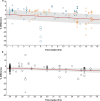Effects of Acute Sleep Loss on Physical Performance: A Systematic and Meta-Analytical Review
- PMID: 35708888
- PMCID: PMC9584849
- DOI: 10.1007/s40279-022-01706-y
Effects of Acute Sleep Loss on Physical Performance: A Systematic and Meta-Analytical Review
Abstract
Background: Sleep loss may influence subsequent physical performance. Quantifying the impact of sleep loss on physical performance is critical for individuals involved in athletic pursuits.
Design: Systematic review and meta-analysis.
Search and inclusion: Studies were identified via the Web of Science, Scopus, and PsycINFO online databases. Investigations measuring exercise performance under 'control' (i.e., normal sleep, > 6 h in any 24 h period) and 'intervention' (i.e., sleep loss, ≤ 6 h sleep in any 24 h period) conditions were included. Performance tasks were classified into different exercise categories (anaerobic power, speed/power endurance, high-intensity interval exercise (HIIE), strength, endurance, strength-endurance, and skill). Multi-level random-effects meta-analyses and meta-regression analyses were conducted, including subgroup analyses to explore the influence of sleep-loss protocol (e.g., deprivation, restriction, early [delayed sleep onset] and late restriction [earlier than normal waking]), time of day the exercise task was performed (AM vs. PM) and body limb strength (upper vs. lower body).
Results: Overall, 227 outcome measures (anaerobic power: n = 58; speed/power endurance: n = 32; HIIE: n = 27; strength: n = 66; endurance: n = 22; strength-endurance: n = 9; skill: n = 13) derived from 69 publications were included. Results indicated a negative impact of sleep loss on the percentage change (%Δ) in exercise performance (n = 959 [89%] male; mean %Δ = - 7.56%, 95% CI - 11.9 to - 3.13, p = 0.001, I2 = 98.1%). Effects were significant for all exercise categories. Subgroup analyses indicated that the pattern of sleep loss (i.e., deprivation, early and late restriction) preceding exercise is an important factor, with consistent negative effects only observed with deprivation and late-restriction protocols. A significant positive relationship was observed between time awake prior to the exercise task and %Δ in performance for both deprivation and late-restriction protocols (~ 0.4% decrease for every hour awake prior to exercise). The negative effects of sleep loss on different exercise tasks performed in the PM were consistent, while tasks performed in the AM were largely unaffected.
Conclusions: Sleep loss appears to have a negative impact on exercise performance. If sleep loss is anticipated and unavoidable, individuals should avoid situations that lead to experiencing deprivation or late restriction, and prioritise morning exercise in an effort to maintain performance.
© 2022. The Author(s).
Conflict of interest statement
Jonathan Craven, Danielle McCartney, Ben Desbrow, Surendran Sabapathy, Phillip Bellinger, Llion Roberts and Christopher Irwin have no conflicts of interest to declare that are directly relevant to the contents of this article.
Figures




